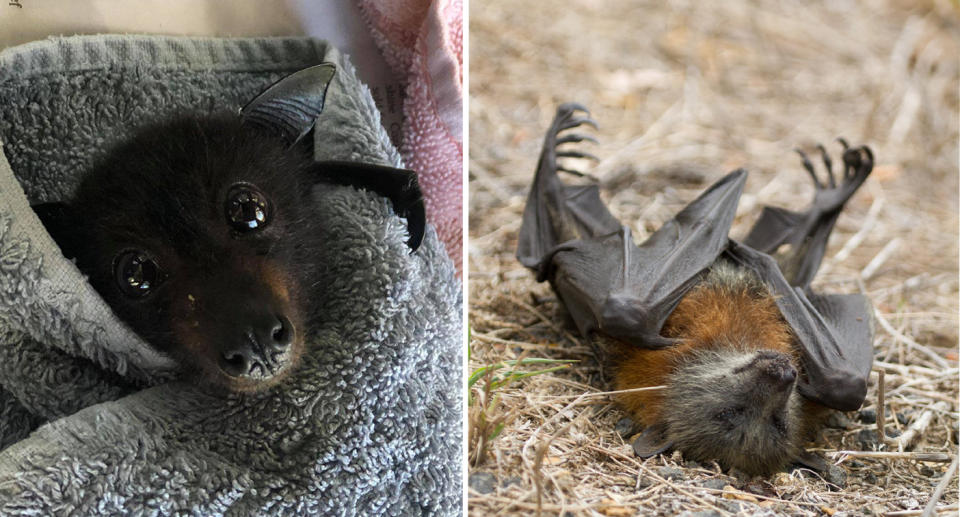Warning not to touch bats found 'starving to death' in the wild
Queensland residents are being warned not to touch or handle fruit bats that have fallen out of trees, following a string of injuries to people who have encountered seemingly lifeless bats on the ground.
According to wildlife experts, species of flying foxes (also known as fruit bats) are suffering through a starvation event occurring across south-east Queensland, with many tired and malnourished bats displaying unusual behaviour and falling out of trees.
Bats QLD, a not-for-profit organisation that rescues and rehabilitates flying foxes says it has been inundated with a record number of calls in recent weeks to help bats across the Gold Coast, southeast Queensland and northeast NSW.

“Sadly bats in the wild are starving to death. Due to deforestation and developments, there are not enough food sources to sustain the wild bats,” the group said in a post Tuesday.
“We, and other bat rescue groups, are witnessing hundreds of bats, predominately juveniles, being rescued that are either emaciated, underweight or on death’s door from starvation.”
This time of year can be tough for flying fox species after enduring winter with less available food. Flying foxes predominately subsist on nectar, pollen, and fruit.
Land clearing and habitat loss is putting increased pressure on bat species as reliable food becomes harder to find.
Bats have been observed breaking with natural behaviour and refusing to return to their their colony, instead hanging in trees during the day where they have found a precious food source, leaving them vulnerable to being attacked by birds.
Public warned not to pick up bats
Queensland’s Wide Bay Hospital & Health Service warned the public not to handle a grounded flying fox, even if they think it’s dead.
“We've unfortunately had 6 incidents in the Wide Bay of people being injured from a bat in the last 17 days. Two of these incidents involved people trying to handle what they thought was a dead bat,” it wrote on Facebook on Friday.
“Two of these incidents involved people trying to handle what they thought was a dead bat. In one case the bat wasn't actually dead, and in the other the person was injured by the dead animal's wing claw.”

All bats potentially carry Australian Bat Lyssavirus and any exposure via a bite or scratch could lead to infection, the group added.
If you do come across grounded bats, it is best to call local bat rescue groups or the RSCPA.
Bats play a crucial role in local ecosystems
Evan Quartermain from the Humane Society International (HSI) has worked with state and federal governments on the threats facing bats.
“Food issues have been a recurring problem over the last decade or so, as we see more and more natural habitats cleared,” he told Yahoo News Australia.
“It’s really hard to predict where the food will be and when for flying foxes.
For instance, spotted gum trees which bats feed on only flower en masse every four to five years, he explained.
Bats typically travel huge distances to feed. The grey-headed flying fox is one of the main species being affected by the starvation event and has “a range that extends pretty much the entire east coast of Australia,” Mr Quartermain said.
Because they travel so far, they are a critical part of the ecosystem and play an essential role in pollination, particularly for trees that only flower at night and can’t rely on birds or bees.

‘They are basically cooked alive’
Habitat loss is also contributing to another big threat facing bat populations: extreme heat events.
Endangered spectacled flying foxes, a species which HSI successfully nominated to be classified as endangered, are particularly susceptible to extreme weather events, Mr Quartermain said.
A spike in temperatures in north Queensland in 2018 saw roughly a third of the local bat population die in two days. An estimated 23,000 spectacled flying foxes died.
“Once it gets above about 40 to 42 degrees, they are basically cooked alive. It’s very distressing stuff,” Mr Quartermain said.
“Habitat loss has basically led to that too because they don’t have the cooler places to go ... and find those micro-climates to help them cope,” he said.
Do you have a story tip? Email: newsroomau@yahoonews.com.
You can also follow us on Facebook and Twitter, download the Yahoo News app from the App Store or Google Play and stay up to date with the latest news with Yahoo’s daily newsletter. Sign up here.



